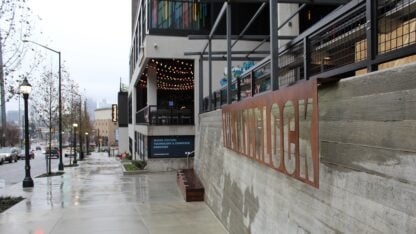Metro Atlanta Keeps Busy With Property Tax Town Hall Meetings

An audio version of this story.
If there’s a universal truth in politics, it’s that no elected official wants to say they raised taxes.
But town hall meetings to discuss property tax increases are especially popular this summer.
Political Science professor David Shock specializes in local tax policy at Kennesaw State University. Shock said the improving economy and pressure to raise wages is partly to blame.
Deferred Maintenance
Shock said one reason counties seem to be increasing taxes at the same time is because many things, like road and infrastructure maintenance, were put off after the 2007 recession.
“A lot of library hours were cut,” Shock said. “And so there’s a desire to try to bring services back to pre-recession levels.”
Shock said with the economy improving, populations growing and the value of homes going up, the timing is right for some counties.
Post-Recession Rates
Gwinnett County is proposing a slight property tax increase to increase retention that would mean the owner of a $200,000 home would pay an additional $21.
Board Commission Chairwoman Charlotte Nash said since 2013, the county has decreased its millage rate.
“In retrospect, perhaps that was not the best thing to do,” she said. “But we were trying to give property tax owners a bit of a break as people were still trying to cover from the recession.”
Employee Retention
There’s another big reason politicians are choosing to raise millage rates: government employees are leaving.
Clint Mueller, legislative director of ACCG: Georgia’s County Association, said “it’s getting harder and harder for government to retain their employees.”
“They were able to get by during the recession without giving their employees raises because there weren’t any jobs for employees to leave and go to, so they were sort of stuck there,” Mueller said. “Certain areas of the private sector can’t find enough workers so they’re willing to pay more and some of the government employees are looking at these higher-paying jobs.”
High Turnover
County and city police departments in metro Atlanta are reporting high turnover rates.
The state of Georgia, for example, recently approved a 20 percent pay raise for its public safety employees.
Mueller also likened it to income tax collection, where the state has kept the income tax rate the same but brings in more revenue when workers receive pay raises.
Additional Revenue
After the state sets the millage rate, if property values increase, city and county governments would need to say it doesn’t want to collect what’s technically additional revenue.
“(Governments) could call it some sort of a revenue increase. One of the things that’s problematic is that even in the private sector, everything goes up over time. You’re going to have to increase your revenue. Things costs more,” Mueller said. “There’s inflation in all kinds of products and services. Same with the products and services that government has to pay for. So to expect revenue stay stagnant from year to year is unrealistic unless you cut back on services.”
Public Hearings
Mueller said governments are required to hold at least three public hearings before elected officials vote on it and must advertise the hearings in the local newspaper.
“There just needs to be that dialogue between the citizens and the people they elect over what’s the level of service they want, what’s the type of services they expect and what are they willing to pay,” Mueller said. “And those are discussions that need to take place jurisdiction by jurisdiction.”
9(MDAxODM0MDY4MDEyMTY4NDA3MzI3YjkzMw004))








